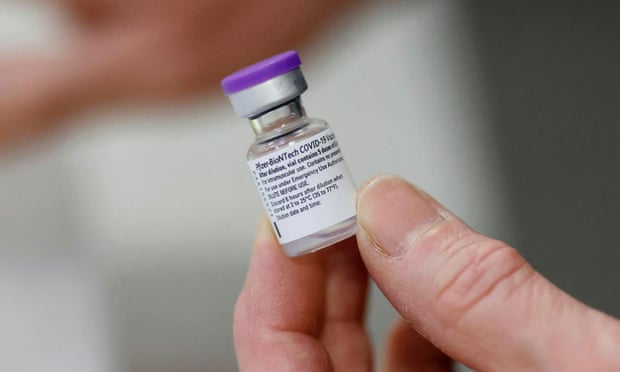Keir Starmer is weighing up whether to support Covid status certificates in a vote within weeks for which he could lend the government crucial support to pass one of its most controversial coronavirus policies.
The Labour leader has been hesitant to endorse a proposal that would mean people would have to prove they had been vaccinated, had a recent negative test or antibodies from prior infection in order to access venues such as theatres and sports stadiums.
A Cabinet Office review of the scheme is still under way, but ministers have given strong hints vaccine status certificates will be introduced – probably between the third and fourth stages of unlocking in England, from 17 May and 21 June, respectively.
A government source did not deny reports that the Cabinet Office minister, Michael Gove, had privately promised some MPs a vote on the proposal. They noted: “There will be appropriate parliamentary scrutiny.”
Labour is trying to keep its options open given that details about the plan are scarce, and will hope that attention remains on the splits within the Conservative party, where more than 40 of Boris Johnson’s backbenchers have branded the idea “divisive and discriminatory” and vowed to oppose it.
But after dozens of prominent Labour backbenchers, including the former party leader Jeremy Corbyn, also pledged to vote against the certificates, Starmer is being forced to decide whether he should give the government the support it may need.
Quick Guide
Vaccines: how effective is each one?

Pfizer/BioNTech
Country US/Germany
Efficacy 95% a week after the second shot. Pfizer says it is only 52% after the first dose but the UK’s Joint Committee on Vaccination and Immunisation (JCVI) says this may rise to 90% after 21 days.
Doses Clinical trials involved two doses 21 days apart. The UK is stretching this to 12 weeks.
Oxford/AstraZeneca
Country UK
Efficacy 70.4% 14 days after receiving the second dose. May have up to 90% efficacy when given as a half dose followed by a full dose. No severe disease or hospitalisations in anyone who received the vaccine. There have been concerns it is less effective against the South African variant of the coronavirus, and some countries have suggested that it is less-effective against either older patients or younger patients.
A UK government-funded study of care home residents in England found that their risk of infection with Covid-19 – either symptomatic or asymptomatic – fell by 62% five weeks after they received their first Oxford/AstraZeneca or Pfizer/BioNTech vaccine dose.
Doses Two, four to 12 weeks apart
Moderna
Country US
Efficacy Phase 3 trial results suggest 94.1%.
Doses Two, 28 days apart
Novavax
Country US
Efficacy Phase 3 trials suggest 89.3%.
Doses Two
Janssen (part of Johnson & Johnson)
Country US
Efficacy 72% in preventing mild to moderate cases in US trials but 66% efficacy observed in international trials. 85% efficacy against severe illness, and 100% protection against hospitalisation and death.
Doses: One, making it unique among Covid vaccines with phase 3 results so far
A Labour source said Starmer’s team was “worried that this issue splits the PLP [parliamentary Labour party] just like it splits the Tory party” and was “really angry” that an interview he gave to the Daily Telegraph last week was headlined on his criticism of the Covid status certificates.
They admitted: “There isn’t really a consensus yet” within the party, though they predicted Labour would probably end up supporting the certificates “but probably not make much of a song and dance about it”.
Another Labour insider stressed: “It really isn’t clear at all” how the government’s proposed system would work, and said: “It’s not sensible to close off any avenue” before further details were confirmed ahead of a vote.
They said the “reservations are real” – particularly around the digital infrastructure of Covid status certificates that are likely to be displayed through the NHS application on a smartphone, given the government’s handling of the development of the test and trace app.
Jonathan Ashworth, the shadow health secretary, on Monday refused to say how the party would vote, but said a certificate scheme could put some people off getting vaccinated by making them feel they were compelled to do so.
“All the evidence has always suggested that if you want to maintain confidence in vaccination, you don’t make it compulsory, you don’t force people into being vaccinated, you encourage people to do it, you persuade people,” he told BBC Radio 4’s World at One programme.
“My worry with what the government are suggesting is they’re effectively trying to force people into taking the vaccine. And I think in the end that would be counter-productive.”
In spite of Labour’s resistance, Johnson has restated the benefits of Covid status certificates.
He said last week: “When it comes to trying to make sure that we give maximum confidence to business and to customers here in the UK, there are three things: your immunity, whether you’ve had it before, so you’ve got natural antibodies anyway; whether you’ve been vaccinated; and then, of course, whether you’ve had a test. And so those three things working together will, I think, be useful.”
This content first appear on the guardian
